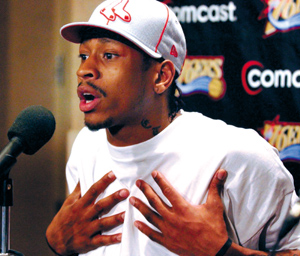Nothing is wrong between Allen Iverson and Larry Brown that a little Oprah, Sally or Montel can’t fix.
But these poor guys have been so busy playing defense (finally) in news conferences the past week that they haven’t had the chance to soak up some television therapy or curl up with a good self-help book.
Truth be told, the Allen and Larry show has been running for five years now. But the last thing we want to see is the 76ers – and their star player and coach – become soap-opera characters.
(Remember “General Hospital”? When Luke and Laura left, the show was never the same.)
So we’ve assembled a panel of well-known experts to assess the relationship between the young and restless Iverson, and Brown, his guiding light.
Joining us today is “America’s psychologist,” Dr. Joyce Brothers, along with the “Psychiatrist to the Stars,” Dr. Carole Lieberman, and best-selling author and self-empowerment guru Dr. Wayne Dyer.
So, Dr. Carole, what’s behind this conflict?
“Allen is a rebellious person, and the coach is a controlling person,” she said.
“They’re obviously going to have power struggles. The more controlling the authority figure is, the more rebellious his subject gets.”
Your best-selling book, “Bad Boys: Why We Love Them, How to Live With Them, and When To Leave Them,” gives names for guys like this, right, Dr. Carole?
“Yes. I guess Larry would be `Mr. Power Mad’ and Allen would be the `The Dramatic Daredevil.’
“You can see where (Iverson) never really had an authority figure – someone who made him listen to him. Some people like this can respond to someone who is an authority figure, but who is a gentle authority figure.”
Dr. Joyce, what about the coach-player relationship?
“It’s a major problem for coaches in all group sports,” she said.
“The people who get to the top, in all areas, not just sports, are people who have great ability and are very self-motivated.
“It’s only really when they have to be a team player that the very qualities that brought them to the top are not necessarily qualities that make for good team play. You can’t ask everybody to follow the rules if somebody doesn’t.”
So, Dr. Joyce, how do you get the two to work together?
“I think you ignore the outbursts. He’s young. The young man needs to be trained, little by little. It’s a tough job for a coach, given the kind of affluence and adulation these athletes are given. They think they’ve hung the moon.”
Dr. Wayne, in your book, “10 Secrets to Success and Inner Peace,” I was particularly struck by No. 6: “You can’t solve a problem with the same mind that created it.” And the seventh secret: “There are no justified resentments.”
How can we save this relationship?
“Well, the way to make relationships great is to never focus on what is wrong, but to put your attention and energy on what is good, what is right, what is positive about the person we’re with,” he said.
“I think Allen was conveying love and respect for Larry Brown and was deeply hurt for having things aired about him. One of the things you have to respect in a relationship is privacy.
“I think they love each other very much, both of them do. They have to put their attention to what they intend to manifest in their relationship. Whether it’s more like a brother or more like a father, they need to be working together, to be kind, to be caring, to be sharing.”
So why the anger and the little sniping, Dr. Wayne?
“They’re both speaking out of frustration. . . A family feud. Who the hell hasn’t had them?”
So, do you think the attention has made it worse?
“We live in a tabloid society that wants to take every actor, every politician, every athlete, find out whatever it is about them and play it out for the whole world to hear.”
Well, now that the world has heard it, on both sides, where do they go from here? Dr. Carole?
“They have to put something above themselves, winning or the team, above their own differences and emotions,” she said.
“Before any relationship can be saved, each person has to have empathy for the other. You have to stand in their shoes, to see why they are acting like this. I don’t know whether they’re willing to do that.
“Perhaps the owner of the team, somebody above, could make them do that to realize how the other was hurt.”

